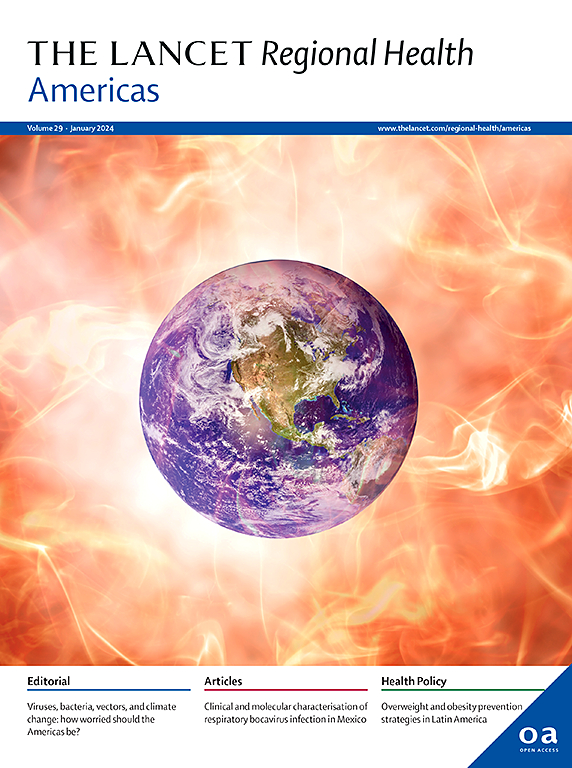在巴西的委内瑞拉移民妇女自评健康的决定因素:一项横断面研究
IF 7
Q1 HEALTH CARE SCIENCES & SERVICES
引用次数: 0
摘要
全球南方国家之间的移民问题仍未得到充分研究,对移民、跨国孕产和健康之间的关系的关注就更少了。本研究考察了影响巴西委内瑞拉移民妇女健康自我认知的因素。方法采用受访者驱动抽样方法对2012年委内瑞拉移民妇女进行横断面研究,这些妇女年龄在15至49岁之间,于2018年至2021年期间移民到巴西。采用层次逻辑回归模型,以95%置信区间计算粗比值比和调整比值比。大约三分之一的移民妇女在委内瑞拉留下了孩子,并在移民期间遭受了暴力。73%的人年龄在15-34岁之间,70%的人完成了高中学业,66%的人是混血儿,75%的人在前一个月没有带薪工作。近四分之一的人获得了政府的财政援助;大多数人在巴西待了一年或不到一年。虽然巴西人对自己健康状况的评价高于委内瑞拉人,但多变量分析显示,较差的自我评价健康状况与留守儿童和遭受暴力密切相关。委内瑞拉移民妇女在抵达巴西后自我评估的健康状况有所改善,这可能是由于获得基本服务和安全的机会有所改善。然而,由于与儿童分离、经济困难以及移民期间和巴西的暴力等压力因素,这种看法有所下降,与跨国孕产和暴力有关的自我评价较差的健康状况。这凸显了这些挑战的累积影响,以及需要制定有针对性的政策来应对这些挑战。本研究得到了英国经济和社会研究理事会(ES/T00441X/1)的支持。本文章由计算机程序翻译,如有差异,请以英文原文为准。
Determinants of self-rated health among Venezuelan migrant women in Brazil: a cross-sectional study
Background
Migration between countries in the Global South remains under-researched, with even less focus on the intersections of migration, transnational motherhood, and health. This study examines factors that impact health self-perception among Venezuelan migrant women in Brazil.
Methods
A cross-sectional study was conducted using Respondent-Driven Sampling with 2012 Venezuelan migrant women, aged 15 to 49, who migrated to Brazil between 2018 and 2021. A hierarchical logistic regression model was applied, calculating crude and adjusted odds ratios with 95% confidence intervals.
Findings
About a third of migrant women left children in Venezuela and experienced violence during migration. 73% were aged 15–34, 70% had completed high school, 66% identified as mixed-race, and 75% lacked paid work in the previous month. Nearly a quarter received government financial aid; most had been in Brazil for a year or less. While they rated their health better in Brazil than in Venezuela, multivariate analysis shows poorer self-rated health is strongly linked to leaving children behind and experiencing violence.
Interpretation
Venezuelan migrant women report better self-assessed health upon arrival in Brazil, likely due to improved access to essential services and safety. However, this perception declines due to stressors such as separation from children, economic hardship, and violence during migration and in Brazil, with poorer self-rated health linked to transnational motherhood and violence. This underscores the cumulative impact of these challenges and the need for targeted policies to address them.
Funding
This work was supported by the UK Economic and Social Research Council (ES/T00441X/1).
求助全文
通过发布文献求助,成功后即可免费获取论文全文。
去求助
来源期刊

Lancet Regional Health-Americas
Multiple-
CiteScore
8.00
自引率
0.00%
发文量
0
期刊介绍:
The Lancet Regional Health – Americas, an open-access journal, contributes to The Lancet's global initiative by focusing on health-care quality and access in the Americas. It aims to advance clinical practice and health policy in the region, promoting better health outcomes. The journal publishes high-quality original research advocating change or shedding light on clinical practice and health policy. It welcomes submissions on various regional health topics, including infectious diseases, non-communicable diseases, child and adolescent health, maternal and reproductive health, emergency care, health policy, and health equity.
 求助内容:
求助内容: 应助结果提醒方式:
应助结果提醒方式:


